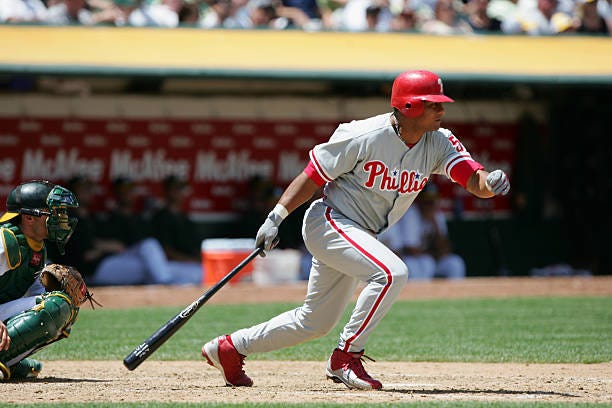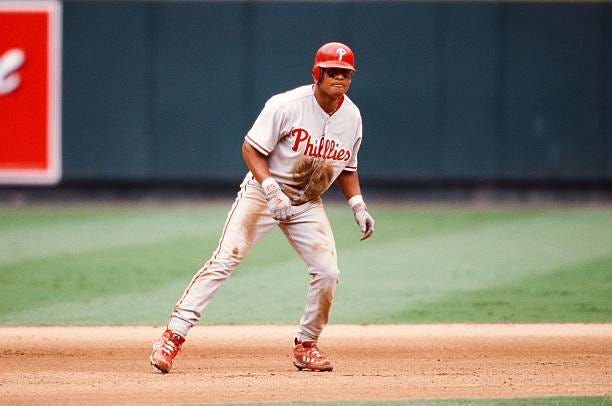So far for the Phillies who are on the 2025 Hall of Fame Ballot, we’ve studied Billy Wagner’s Hall of Fame case, who’s staring at his final shot at election via the BBWAA vote. Next up: Bobby Abreu.
Bobby Abreu (Phillies tenure: 1998-2006)
On November 18th, 1997, Bobby Abreu was selected by the Devil Rays in that year’s MLB Expansion Draft, after the Houston Astros left him unprotected in favor of Richard Hidalgo. In a crazy turn of events, Tampa Bay would actually trade Abreu to Philadelphia for Kevin Stocker just hours after they drafted him. For the next nine years, Abreu would have some of the best offensive numbers in MLB. From 1998-2005 (excluding ‘06 since he was traded to the Yankees mid-season) he had a slashline of .305/.415/.519 to go along with a .933 OPS. He had 20+ home runs seven times, averaged 40 doubles & 29 stolen bases a season, and had 100 walks in seven of those eight seasons during that span. He ranked fifth in Baseball Reference’s Wins Above Replacement statistic in those eight seasons, showing he was actually among the best hitters in MLB during his peak. He was an exceptional all-around offensive player. Unfortunately, as far as accolades go, the hardware did not match his production at the plate. He made the All-Star team only twice, won one Silver Slugger & Gold Glove each, and garnered down-ballot MVP votes, never finishing higher than 14th in voting in five different seasons as a Phillie.
Rest of Abreu’s career
Before Abreu was traded to the Phillies, he started his career with the Houston Astros, debuting in 1996. He didn’t do much with Houston, finishing with a .687 OPS, playing only 74 games in two seasons. Then the aforementioned expansion draft & trade happened in ‘97, and Abreu was in Philadelphia until July of 2006 when he was traded to the Yankees, along with Cory Lidle for four minor league players. Abreu had good numbers with New York the few months remaining in the season after the trade (.330/.419/.507). He remained a Yankee for the next two seasons, where his production started to dip, but was still a good offensive player, driving in at least 100 runs & swiping no less than 20 bags in both of those years. After his time with the Bronx Bombers, he played with the Angels for three and a half seasons. His first two years were fine out West (118 OPS+), but 2011 is when he started to show signs of decline. Through 142 games, he only hit 8 home runs, had an OPS barely above .700, and had a career-low 127 hits (min. 140 games). Realizing the aging star’s drop in production, the Angels released him in April of 2012. The Dodgers picked him up as a free agent just a week later, and was a shell of himself in 92 games with his new team, collecting a -0.3 bWAR with only a .704 OPS. His last hurrah was with the Mets in 2014, where the 40 year old wasn’t close to the player he was years prior. He had one homer and a .680 OPS in 78 games.
Abreu never had super flashy numbers during his career. He never hit more than 31 home runs and only stole 40 bases once in a season. He only had a higher batting average than .320 once (.335 in 1999). He doesn’t have much to show from the cumulative numbers outside of his 574 doubles & 400 stolen bases. He’s 12 home runs short of 300, 30 hits short of 2,500, and nine points below a career .300 average. The traditional numbers probably don’t speak to a Hall of Fame resume. Some of the deeper metrics help make a better case. I already mentioned where he ranked among players in WAR during his prime, being in the top five for a seven-year stretch. His 7-year peak WAR (41.6) is right around the average (42.4) for right fielders that are in the Hall of Fame. His below average defense in the outfield (-55 defensive runs saved) bring his overall WAR total down to 60.2, a little more than 10 below the average RF (71.1). But that’s still a higher sum than Vladimir Guerrero (59.5), Enos Slaughter (57.6), and just below Dave Winfield (64.2)...all Hall of Famers. Along with those advanced numbers, Abreu is in some good company in certain categories. He’s one of seven players with 250+ HR and 350+ SB (Barry Bonds, Rickey Henderson, Jeter, Craig Biggio, Joe Morgan, Bobby Bonds). He’s twentieth all-time in walks (1476). Abreu is one of 14 players in the history of the game to have six 100 run/100 BB seasons, according to Chris Bodig. The other 13 to do it are all in the Hall of Fame, besides Barry Bonds (Babe Ruth, Lou Gehrig, Jimmie Foxx, Joe Morgan, Ted Williams, Rickey Henderson, Mickey Mantle, Mike Schmidt, Mel Ott, Frank Thomas, Jim Thome and Jeff Bagwell).
Could any of this profile into a Hall of Fame plaque?
What to expect for Abreu on this year’s ballot
This will be his sixth time on the BBWAA ballot. The first five years he produced 5.5%, 8.7%, 8.6%, 15.4%, and 14.8%. He barely saw any movement last year, actually dropping a few decimal percentage points after getting a decent jump in his fourth year. The next couple of years will be crucial for Abreu, and this year may be tough as it’s a stacked list of names. Billy Wagner was 1.2% away from being enshrined last year, and this year is his final shot. Andruw Jones is in year number eight (61.6% last year) Carlos Beltran is in year number three (57.1% last year), and both will be close in January. There’s Alex Rodriguez and Manny Ramirez, who both garnered at least 30% in 2024’s election. Former Phillies greats Chase Utley and Jimmy Rollins will be sure to get support. It also includes newcomers C.C. Sabathia (3,093 career strikeouts), Dustin Pedroia (former MVP) and Felix Hernandez (former Cy Young). Oh, someone who will most likely be a shoo-in on his first ballot, Ichiro Suzuki. But Abreu isn’t in the worst spot. Larry Walker, also a former right fielder & has a plaque of his own, received 11.8% in his fifth year, after debuting at 20.3% in 2011. He would get 15.5% of the vote on his sixth try, and would see strong jumps of support over the next three years (21.9%, 34.1%, 54.6%) until he was enshrined in his final year (76.6%). Could something like that be a route for Abreu into Cooperstown? Time will tell, and it will be interesting to see what will happen for him on the 2025 ballot.


